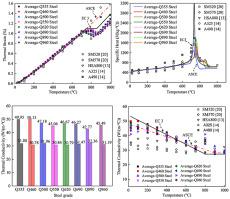Fire Safety Journal ( IF 3.4 ) Pub Date : 2021-04-09 , DOI: 10.1016/j.firesaf.2021.103348 Yonghui Xing , Weiyong Wang , Hisham Al-azzani

|
Accurate assessment of the thermal properties of steel is a key issue in the fire simulation and design of steel structures. Thermal property tests were conducted for seven types of high-strength steels (HSSs), namely Q460, Q500, Q550, Q620, Q690, Q890, and Q960 steels, along with conventional mild steel Q345. The thermal expansion, specific heat, and thermal conductivity of various steels at a temperature range of 25–1000 °C were obtained and compared to the results proposed by Eurocode 3 and ASCE to validate the applicability of these codes to HSSs. The test results showed that the phase transition temperature of HSS was lower than that of mild steel, and HSS experienced substantial thermal expansion at elevated temperatures. Eurocode 3 and ASCE can be used to approximate the thermal expansion of the HSS only before the phase transition temperature. The endothermic capacity of HSS was weaker than that of mild steel at elevated temperatures. The specific heat of the various types of HSSs could only be effectively predicted by Eurocode 3 and ASCE up to 600 °C, whereas their thermal conductivity could not be reasonably predicted by these codes in temperature range of 25–1000 °C. New equations for thermal expansion, specific heat, and thermal conductivity were proposed to accurately assess the thermal properties of HSS.
中文翻译:

评估各种类型的高强度钢在高温下的热性能
准确评估钢的热性能是钢结构火灾模拟和设计中的关键问题。对七种类型的高强度钢(HSS)进行了热性能测试,即Q460,Q500,Q550,Q620,Q690,Q890和Q960钢,以及常规的低碳钢Q345。获得了各种钢在25–1000°C的温度范围内的热膨胀,比热和热导率,并将其与Eurocode 3和ASCE提出的结果进行了比较,以验证这些规范对HSS的适用性。测试结果表明,HSS的相变温度低于低碳钢,HSS在升高的温度下会发生明显的热膨胀。仅在相变温度之前,Eurocode 3和ASCE才能用于估算HSS的热膨胀。在高温下,高速钢的吸热能力弱于低碳钢。欧洲规范3和ASCE只能在不超过600°C的温度下有效预测各种类型HSS的比热,而在25–1000°C的温度范围内,这些热导率无法通过这些规则合理地预测。提出了新的热膨胀,比热和热导率方程,以准确评估HSS的热性能。然而,这些规范无法在25–1000°C的温度范围内合理预测其导热系数。提出了新的热膨胀,比热和热导率方程,以准确评估HSS的热性能。然而,这些规范无法在25–1000°C的温度范围内合理预测其导热系数。提出了新的热膨胀,比热和热导率方程,以准确评估HSS的热性能。











































 京公网安备 11010802027423号
京公网安备 11010802027423号